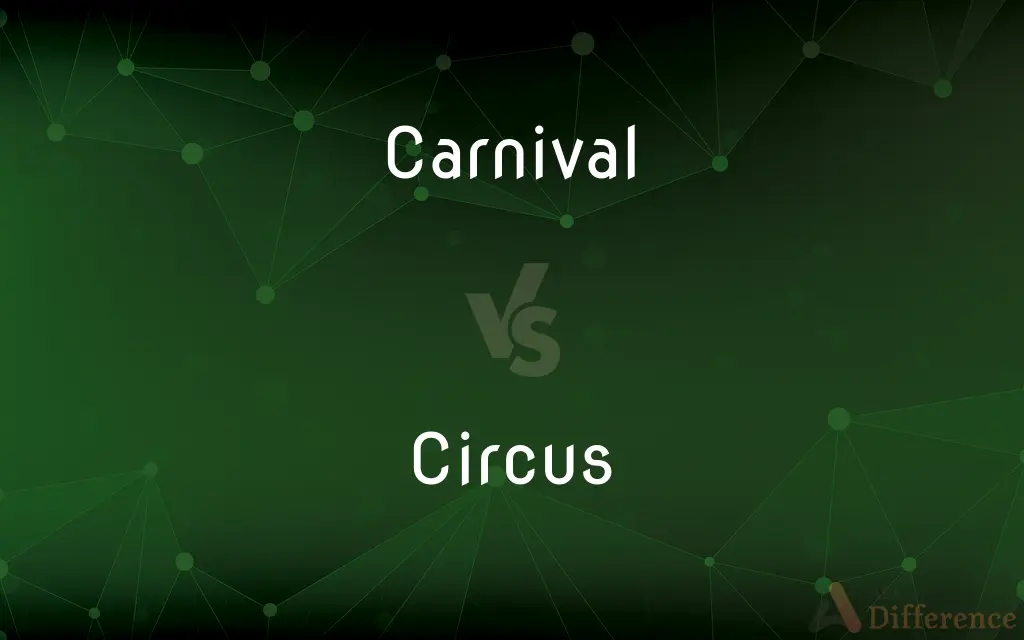Carnival vs. Circus — What's the Difference?
By Urooj Arif & Maham Liaqat — Updated on March 7, 2024
Carnival and circus, while both associated with entertainment, differ primarily in scope and offerings. Carnivals are traveling fairs with games, rides, and food, while circuses focus on performances like acrobatics and animal acts.

Difference Between Carnival and Circus
Table of Contents
ADVERTISEMENT
Key Differences
Carnivals are large public events featuring a variety of attractions such as rides, games, and food stalls, often with a traveling aspect, bringing entertainment to different locations. They can include temporary amusement rides, skill games where prizes can be won, and various food vendors selling traditional fair food. Circuses, on the other hand, are centered around live performances in a ring or stage setting, typically featuring acrobats, clowns, trained animals, trapeze acts, jugglers, and other variety performers.
The historical roots of carnivals trace back to various festive traditions, often linked to religious celebrations and seasonal festivals, evolving into secular events focused on entertainment and community engagement. Carnivals have a fluid format, adapting to local cultures and preferences, making each one unique in its offerings and atmosphere.
Circuses have a distinct history that began in the late 18th century, with the modern circus originating in England before spreading worldwide. The circus was originally designed as a showcase of equestrian skills but evolved to include a wide range of performance arts. The focus on a central performance area, or ring, remains a defining characteristic of circuses, distinguishing them from the more sprawling layout of carnivals.
Carnivals typically operate on a larger scale in terms of physical footprint, often spreading out over wide areas to accommodate various attractions and activities. This expansive setup allows for a diverse range of experiences within the same venue, from thrilling rides to skill games and live music performances.
Circuses, while potentially occupying large tents or arenas, concentrate the audience's attention towards a single performance area. This setup creates a more intimate experience, with spectators gathered around to watch the performances unfold in a collective setting, fostering a sense of shared wonder and excitement.
ADVERTISEMENT
Comparison Chart
Definition
A traveling fair with games, rides, and food stalls.
A show with acrobats, clowns, and animal acts.
Main Attractions
Rides, games, food vendors.
Live performances, including acrobatics and comedy.
Setting
Outdoor, often sprawling over large areas.
Typically in tents or arenas with a central stage or ring.
Focus
Broad entertainment with a variety of attractions.
Performance art and skillful displays.
Historical Origins
Festive traditions and religious celebrations.
Originated in the late 18th century as equestrian showcases.
Compare with Definitions
Carnival
An atmosphere of bustling activity or celebration.
The street market had a carnival vibe, with music and laughter filling the air.
Circus
A company of performers showcasing acrobatics and animal tricks.
The circus is coming to town, featuring an amazing trapeze act and clown performances.
Carnival
A festive season or event involving public revelry.
Mardi Gras is often referred to as a carnival due to its elaborate parades and costumes.
Circus
A situation or scene of noisy confusion.
The busy airport felt like a circus, with people rushing in all directions.
Carnival
A metaphor for a scene of chaos or revelry.
The school fair turned into a carnival, with kids running around enjoying various activities.
Circus
An arena or tent where circus shows are held.
The big top circus tent was set up in the central park for weekend performances.
Carnival
A traveling fair with amusement rides and games.
The carnival arrives in town every summer, bringing joy with its colorful rides and challenging games.
Circus
A round open space in a town or city, often used as a marketplace or for public gatherings.
Piccadilly Circus is a famous road junction and public space in London's West End.
Carnival
A service or organization providing entertainment.
The local carnival company is known for its high-quality rides and friendly staff.
Circus
An adjective describing something flamboyant or spectacular.
The gala had a circus theme, complete with performers on stilts and jugglers.
Carnival
Carnival is a Western Christian festive season that occurs before the liturgical season of Lent. The main events typically occur during February or early March, during the period historically known as Shrovetide (or Pre-Lent).
Circus
A circus is a company of performers who put on diverse entertainment shows that may include clowns, acrobats, trained animals, trapeze acts, musicians, dancers, hoopers, tightrope walkers, jugglers, magicians, unicyclists, as well as other object manipulation and stunt-oriented artists. The term circus also describes the performance which has followed various formats through its 250-year modern history.
Carnival
An annual festival, typically during the week before Lent in Roman Catholic countries, involving processions, music, dancing, and the use of masquerade
A carnival parade
Mardi Gras is the last day of carnival
The culmination of the week-long carnival
Circus
A travelling company of acrobats, clowns, and other entertainers which gives performances, typically in a large tent, in a series of different places
A circus elephant
I was thrilled by the annual visits of the circus
Carnival
A travelling funfair or circus
He worked at a carnival, climbing Ferris wheels and working 18-hour days
Circus
(in ancient Rome) a rounded or oval arena lined with tiers of seats, used for equestrian and other sports and games
The Circus Maximus
Carnival
Often Carnival The period of merrymaking and feasting celebrated just before Lent.
Circus
A rounded open space in a town or city where several streets converge
Piccadilly Circus
Carnival
A traveling amusement show usually including rides, games, and sideshows.
Circus
A public entertainment consisting typically of a variety of performances by acrobats, clowns, and often trained animals.
Carnival
A festival or revel
Winter carnival.
Circus
A traveling company that performs such entertainments.
Carnival
Any of a number of festivals held just before the beginning of Lent.
Carnival of Brazil
Venice Carnival
Circus
A circular arena, surrounded by tiers of seats and often covered by a tent, in which such shows are performed.
Carnival
A festive occasion marked by parades and sometimes special foods and other entertainment.
Circus
A roofless oval enclosure surrounded by tiers of seats that was used in antiquity for public spectacles.
Carnival
(US) A traveling amusement park, called a funfair in British English.
We all got to ride the merry-go-round when they brought their carnival to town.
When the carnival came to town, every one wanted some cotton candy.
Circus
Chiefly British An open circular place where several streets intersect.
Carnival
A festival celebrated with merriment and revelry in Roman Gatholic countries during the week before Lent, esp. at Rome and Naples, during a few days (three to ten) before Lent, ending with Shrove Tuesday.
The carnival at Venice is everywhere talked of.
Circus
(Informal) Something suggestive of a circus, as in frenetic activity or noisy disorder
"I was amazed at the amount of hubbub in the lobby ... it was a circus. The check-in area brought to mind a mustering station on a foundering cruise ship" (Bill Bryson).
Carnival
Any merrymaking, feasting, or masquerading, especially when overstepping the bounds of decorum; a time of riotous excess.
He saw the lean dogs beneath the wallHold o'er the dead their carnival
Circus
A traveling company of performers that may include acrobats, clowns, trained animals, and other novelty acts, that gives shows usually in a circular tent.
The circus will be in town next week.
Carnival
A festival marked by merrymaking and processions
Circus
A round open space in a town or city where multiple streets meet.
Oxford Circus in London is at the north end of Regent Street.
Carnival
A frenetic disorganized (and often comic) disturbance suggestive of a circus or carnival;
It was so funny it was a circus
The whole occasion had a carnival atmosphere
Circus
(figurative) A spectacle; a noisy fuss; a chaotic and/or crowded place.
Carnival
A traveling show; having sideshows and rides and games of skill etc.
Circus
(historical) In the ancient Roman Empire, a building for chariot racing.
Circus
A code name for bomber attacks with fighter escorts in the day time. The attacks were against short-range targets with the intention of occupying enemy fighters and keeping their fighter units in the area concerned.
Circus
(obsolete) Circuit; space; enclosure.
Circus
To take part in a circus; or to be displayed as if in a circus
Circus
A level oblong space surrounded on three sides by seats of wood, earth, or stone, rising in tiers one above another, and divided lengthwise through the middle by a barrier around which the track or course was laid out. It was used for chariot races, games, and public shows.
Circus
A circular inclosure for the exhibition of feats of horsemanship, acrobatic displays, etc. Also, the company of performers, with their equipage.
Circus
Circuit; space; inclosure.
The narrow circus of my dungeon wall.
Circus
A travelling company of entertainers; including trained animals;
He ran away from home to join the circus
Circus
Performance given by a traveling company of acrobats clowns and trained animals;
The children always love to go to the circus
Circus
A frenetic disorganized (and often comic) disturbance suggestive of a circus or carnival;
It was so funny it was a circus
The whole occasion had a carnival atmosphere
Circus
(antiquity) an open-air stadium for chariot races and gladiatorial games
Circus
An arena consisting of an oval or circular area enclosed by tiers of seats and usually covered by a tent;
They used the elephants to help put up the circus
Circus
A genus of haws comprising the harriers
Common Curiosities
Can carnivals have live performances like a circus?
Yes, carnivals can include live performances such as music, dance, or small-scale theatrical shows, but these are not usually the main focus.
How are circuses and carnivals similar?
Both aim to entertain and amuse their audiences, often through a variety of acts and attractions, and both can have a traveling nature.
Are carnivals and circuses suitable for all ages?
Generally, yes. Both carnivals and circuses design their attractions and performances to appeal to a wide range of ages, though some rides or shows may have age or height restrictions.
Can one find food stalls at a circus like at a carnival?
Food is available at circuses, typically focusing on snacks and quick eats that can be enjoyed while watching the performances, unlike the more extensive food options at carnivals.
Do circuses always involve animal performances?
Historically, many circuses included animal performances, but modern circuses, especially contemporary and ethical ones, may focus solely on human acrobatics and clown acts.
Is it common for circuses to set up within carnivals?
While they are distinct entities, smaller circus acts or performances can sometimes be part of a carnival's entertainment lineup.
Do circuses still use tents?
Yes, many traditional circuses use large tents, often called "big tops," but others may perform in permanent buildings or arenas.
What is the primary difference between a carnival and a circus?
A carnival is a traveling fair with rides, games, and food, while a circus is a performance show featuring acrobatics, clowns, and animal acts.
How long do carnivals and circuses typically stay in one location?
The duration can vary widely, but both usually stay in one location for a limited period, ranging from a few days to several weeks, before moving on to the next destination.
How do I know if a circus or carnival is ethical, especially regarding animal welfare?
Research the organization's practices, look for accreditations or endorsements from animal welfare groups, and consider supporting circuses that focus on human performance art.
Are there any modern alternatives to traditional circuses?
Yes, contemporary circuses that emphasize theatricality, story, and acrobatic performance without animal acts, such as Cirque du Soleil, have become popular.
What types of games are common at carnivals?
Typical carnival games include ring toss, dart throwing, shooting galleries, and various other skill-based challenges.
What safety measures are in place at carnivals and circuses?
Operators are required to adhere to safety regulations and guidelines, including regular maintenance of equipment and ensuring that performances are conducted safely.
Can carnivals be part of larger festivals or events?
Yes, carnivals are often included as part of larger community festivals, celebrations, or fairs, adding to the overall entertainment and activity options available.
How do circuses train their performers?
Circus performers often undergo rigorous training in their specific art form, sometimes from a young age, at specialized schools or through apprenticeships.
Share Your Discovery

Previous Comparison
Blanket vs. Throw
Next Comparison
Trebled vs. TrebleAuthor Spotlight
Written by
Urooj ArifUrooj is a skilled content writer at Ask Difference, known for her exceptional ability to simplify complex topics into engaging and informative content. With a passion for research and a flair for clear, concise writing, she consistently delivers articles that resonate with our diverse audience.
Co-written by
Maham Liaqat














































